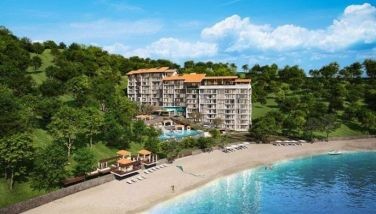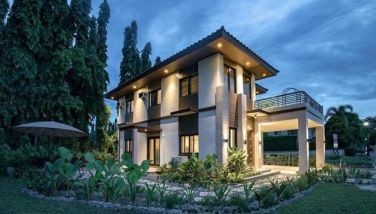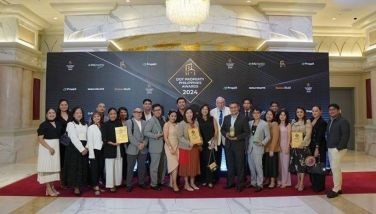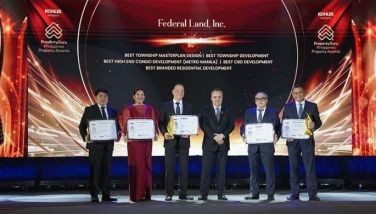New Pinoy housing system unveiled
February 10, 2006 | 12:00am
Many may not have even heard of "value engineering" at all, but it’s in this new field of discipline where a structural engineer has suddenly found himself, in his search for solutions to the rising prices of conventional housing.
The search brought Engineer Bow Moreno to the tedious process of sorting out the prices of construction materials in various combinations and assessing their total optimum value to a person building his own house at the least possible time and cost.
That process is what Moreno calls "value engineering", through which he has succeeded in designing a system that can build and finish a 72-square-meter, 24-foot-high, two-storey townhouse with spacious attic in just 12 days and for only P680,000.
Calling it a "Built to Order Web" (BOW) system, Moreno is applying it in the construction of two rows of five-door townhouses with such dimensions in a commercial area along Gil Fernando Avenue in Marikina City.
Moreno is building the 10 townhomes within 120 days (or 12 days per unit) using the BOW system for the GMA-7 Employees Multi-Purpose Cooperative, whose housing project is envisioned to reach a total of 250 units in and around Metro Manila.
"I won the project because my BOW system offered the highest value for the client’s money," Moreno says referring to GMA-7 Coop’s housing requirements.
The BOW system uses readily available lightweight materials with strength equivalent to or more than the conventional ones. These materials include 3x3-inch angular bars welded together and joined by round steel bars to form 3x6-inch channels that serve as columns and beams, which are easily and swiftly assembled to constitute the skeletal frame of the house. Concrete mix is then poured onto the channels and the flooring of the first and second floors, with rough finish for the first for ceramic tiling and straight finish for the second for vinyl, thus eliminating the need for topping.
The now concrete framework is then clad with M2 panels — consisting of corrugated Styrofoam boards sandwiched by an interconnected pair of galvanized wire mesh – which are plastered with cement using pressurized bucket spray for strong, efficient bonding. Soon the roof is installed on steel purlins and the gutter on HardiFlex Senepa fascia board, thus leaving only the stairs, partitions, and ceiling still unfinished.
The stairs and toilet/bathroom are done the conventional way, but for the partitions, Moreno uses HardiFlex fiber cement boards, and for the ceiling HardiFlex Lite fiber cement board. "These materials are durable and almost low-maintenance-free, simple and quick to install, and resistant to damage from impact, fire, termites, water, and severe weather conditions, while providing heat insulation to the house. And unlike all other locally-produced fiber cement boards, HardiFlex does not contain carcinogenic chrysotile asbestos fiber or abestos that can endanger the health of my workers and clients," Moreno says.
Being a structural engineer, Moreno is so exacting on the dimensions and tenacity of his materials that he cannot use wood, gypsum, or strongboards for his BOW system.
"With lumber and plywood, you’ll only be cheated when it comes to thickness and these materials are easily gutted by fire, eaten by termites, destroyed by water, and consumes a lot of paint, which eventually flakes away," Moreno explains.
"Gypsum, on the other hand, is easily damaged by water and impact, while strongboards (magnesium oxide) are very laborious to install and easily break at the edges, with the patching compound (masilya) cracking in between boards.
"You see, the secret of the BOW system is in the fast, efficient, and economical construction of a light but very durable house from improvisation and right combination of materials that provide optimum value to the end-user at the least cost," Moreno adds.
More information on the system can be obtained from value engineering specialist Bow C. Moreno Construction (tel. 8267872, 8208093, or email [email protected]).
The BOW system has also been applied in other structures, including the Ann Arbor Montessori School in BF Homes, Parañaque City.
The search brought Engineer Bow Moreno to the tedious process of sorting out the prices of construction materials in various combinations and assessing their total optimum value to a person building his own house at the least possible time and cost.
That process is what Moreno calls "value engineering", through which he has succeeded in designing a system that can build and finish a 72-square-meter, 24-foot-high, two-storey townhouse with spacious attic in just 12 days and for only P680,000.
Calling it a "Built to Order Web" (BOW) system, Moreno is applying it in the construction of two rows of five-door townhouses with such dimensions in a commercial area along Gil Fernando Avenue in Marikina City.
Moreno is building the 10 townhomes within 120 days (or 12 days per unit) using the BOW system for the GMA-7 Employees Multi-Purpose Cooperative, whose housing project is envisioned to reach a total of 250 units in and around Metro Manila.
"I won the project because my BOW system offered the highest value for the client’s money," Moreno says referring to GMA-7 Coop’s housing requirements.
The BOW system uses readily available lightweight materials with strength equivalent to or more than the conventional ones. These materials include 3x3-inch angular bars welded together and joined by round steel bars to form 3x6-inch channels that serve as columns and beams, which are easily and swiftly assembled to constitute the skeletal frame of the house. Concrete mix is then poured onto the channels and the flooring of the first and second floors, with rough finish for the first for ceramic tiling and straight finish for the second for vinyl, thus eliminating the need for topping.
The now concrete framework is then clad with M2 panels — consisting of corrugated Styrofoam boards sandwiched by an interconnected pair of galvanized wire mesh – which are plastered with cement using pressurized bucket spray for strong, efficient bonding. Soon the roof is installed on steel purlins and the gutter on HardiFlex Senepa fascia board, thus leaving only the stairs, partitions, and ceiling still unfinished.
The stairs and toilet/bathroom are done the conventional way, but for the partitions, Moreno uses HardiFlex fiber cement boards, and for the ceiling HardiFlex Lite fiber cement board. "These materials are durable and almost low-maintenance-free, simple and quick to install, and resistant to damage from impact, fire, termites, water, and severe weather conditions, while providing heat insulation to the house. And unlike all other locally-produced fiber cement boards, HardiFlex does not contain carcinogenic chrysotile asbestos fiber or abestos that can endanger the health of my workers and clients," Moreno says.
Being a structural engineer, Moreno is so exacting on the dimensions and tenacity of his materials that he cannot use wood, gypsum, or strongboards for his BOW system.
"With lumber and plywood, you’ll only be cheated when it comes to thickness and these materials are easily gutted by fire, eaten by termites, destroyed by water, and consumes a lot of paint, which eventually flakes away," Moreno explains.
"Gypsum, on the other hand, is easily damaged by water and impact, while strongboards (magnesium oxide) are very laborious to install and easily break at the edges, with the patching compound (masilya) cracking in between boards.
"You see, the secret of the BOW system is in the fast, efficient, and economical construction of a light but very durable house from improvisation and right combination of materials that provide optimum value to the end-user at the least cost," Moreno adds.
More information on the system can be obtained from value engineering specialist Bow C. Moreno Construction (tel. 8267872, 8208093, or email [email protected]).
The BOW system has also been applied in other structures, including the Ann Arbor Montessori School in BF Homes, Parañaque City.
BrandSpace Articles
<
>
- Latest
Latest
Latest
October 11, 2024 - 3:45pm
October 11, 2024 - 3:45pm
October 10, 2024 - 11:30am
October 10, 2024 - 11:30am
October 5, 2024 - 12:08pm
October 5, 2024 - 12:08pm
September 24, 2024 - 1:00pm
September 24, 2024 - 1:00pm
September 13, 2024 - 4:00pm
September 13, 2024 - 4:00pm
September 9, 2024 - 9:45am
September 9, 2024 - 9:45am
Recommended
December 28, 2024 - 12:00am




























